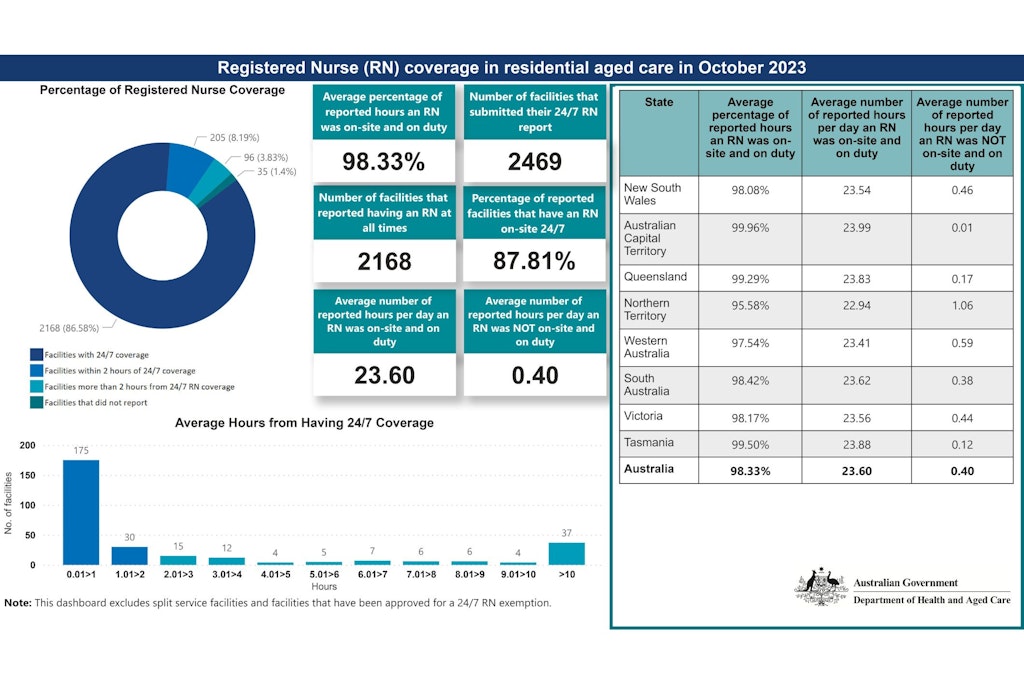Could success with a 24/7 RN exemption lead to mandate changes?
Last updated on 30 November 2023

The Aged Care Quality and Safety Commission recently released a new document outlining alternative clinical care requirements for aged care providers when a Registered Nurse (RN) is not on-site.
The detailed eight-page document provides several strong examples of what providers can do to meet the clinical care needs of residents at all times. A spokesperson for the Department of Health and Aged Care told hello leaders it’s designed to help those with exemptions from the 24/7 RN responsibility facing workforce shortages.
“The 24/7 Registered Nurse alternative clinical care arrangements note released by the Aged Care Quality and Safety Commission outlines alternative arrangements providers may have in place where they have gaps in RN coverage due to workforce shortages to ensure that residents’ clinical care needs are met at all times,” a spokesperson said.
“As outlined in the Regulatory Bulletin – Workforce Related Responsibilities providers are expected have alternative clinical care arrangements in place where there are gaps in RN coverage, as well as to continue to take reasonable steps to comply with their workforce-related responsibilities (including 24/7 RN) through ongoing efforts to recruit and retain staff.”
To be eligible for exemptions, facilities must be located in a Modified Monash Model (MMM) 5, 6 or 7 area; have 30 or fewer operational places and have appropriate alternative clinical care arrangements in place. As it stands, 40 aged care facilities have exemptions until June 30, 2024, representing 1.6% of the sector. Six providers have seen their exemptions come to an end.
As per Government records, each approved provider with an exemption has alternative clinical care arrangements in place, including:
- On-call arrangements with RNs
- On-call arrangements with General Practitioners and/or other clinicians
- Access to clinical support via telehealth (including on-call arrangement/s with specialist telehealth service/s)
- Enrolled Nurses and/or Endorsed Enrolled Nurses on-site and on duty when RN is not available (with on-call access to RNs and/or other clinicians)
These arrangements are not new, many providers in regions where RNs are in short supply have had them in place for some time. It’s only the 24/7 RN requirement that has placed additional pressure on their abilities to be compliant. And so, with the publication of these arrangements could we see a change to 24/7 RN requirements once the current exemption period ends?
The spokesperson for the Department of Health and Aged Care told hello leaders that the exemption policy beyond June 30, 2024, is a decision of the Government and the Department cannot comment on any change.

- Meanwhile, the October snapshot of RN coverage in residential aged care shows that 86.6% of facilities have 24/7 coverage. Another 8.2% are within two hours of meeting full coverage.
- With roughly 5% of the sector either not reporting or more than two hours from meeting requirements (data excludes facilities with exemptions) wholesale change to reforms seems unlikely.
- However, more recent additions to the exemption page show the Government is using current experiences to inform future exemption processes and requirements. This will include further exploration of alternative clinical care arrangements and the development of a model of regions where RN workforce shortages are found.
Altogether, this data suggests the next seven months will play an important role in the future of 24/7 RN requirement exemptions and the 40 approved providers with one – plus other providers struggling to close the coverage gap – could still influence change.
An uptake in reporting could also help with the Department’s spokesperson highlighting that the accuracy of 24/7 RN reports is dependent on provider submission and that they are periodically checked by the Department as part of the care time reporting assessment program.
More information is available on their website if providers have any queries about their reporting requirements.